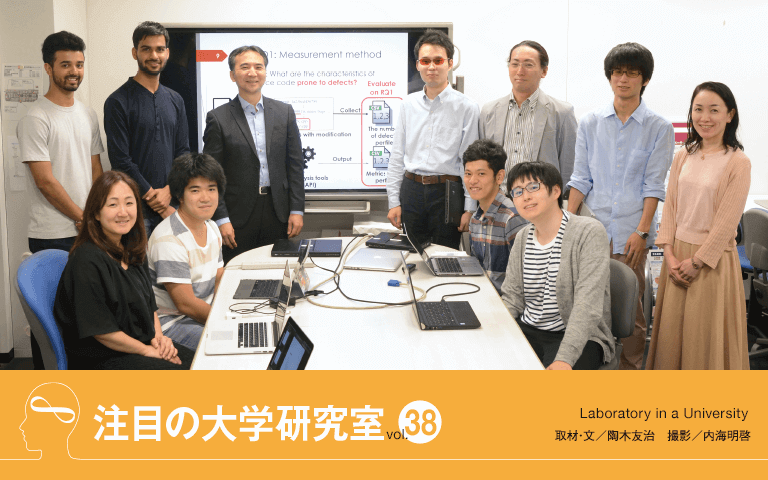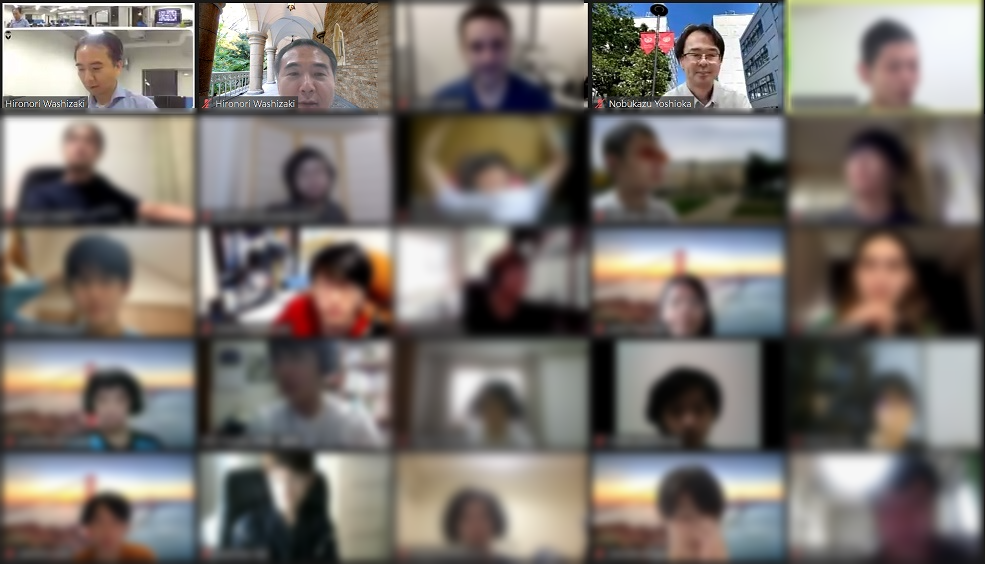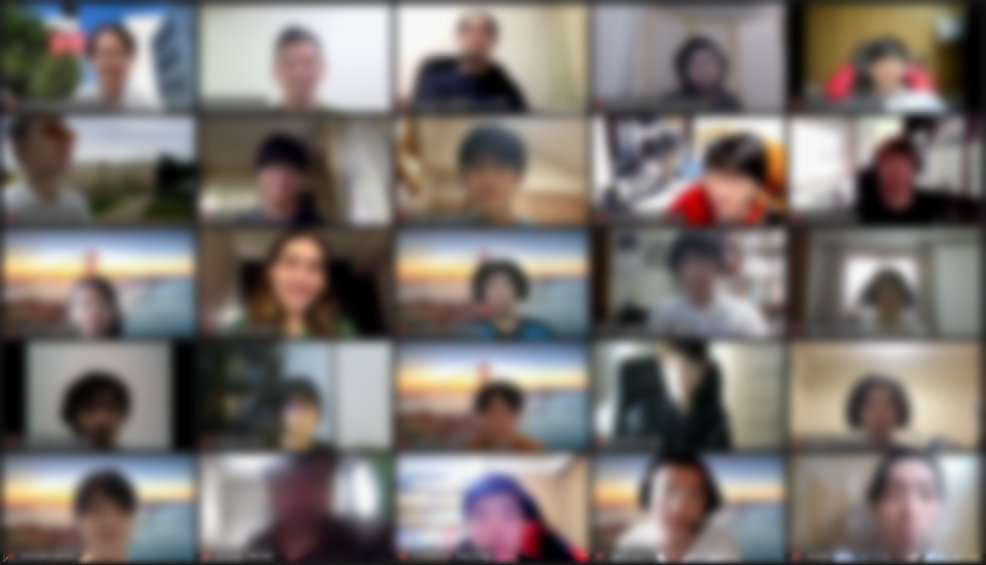Jomphon Runpakprakun, Sien Reeve Ordonez Peralta, Hironori Washizaki, Foutse Khomh, Yann-Gael Gueheneuc, Nobukazu Yoshioka, Yoshiaki Fukazawa, “Software Engineering Patterns for Machine Learning Applications (SEP4MLA) – Part 3 – Data Processing Architectures,” 28th Conference on Pattern Languages of Programs (PLoP 2021), pp. 1-11, 2021. (CORE Rank B)
Accelerating covering array generation by combinatorial join for industry scale software testing, accepted for PeerJ Computer Science (SCIE, IF=1.39)
Hiroshi Ukai, Xiao Qu, Hironori Washizaki, and Yoshiaki Fukazawa, “Accelerating covering array generation by combinatorial join for industry scale software testing,” PeerJ Computer Science, pp. 1-31, 2021. (SCIE, IF=1.39)
Prof. Washizaki gave keynote titled “Software Engineering Patterns for Machine Learning Applications” at ICETCI2021
Prof. Washizaki gave keynote titled “Software Engineering Patterns for Machine Learning Applications” at ICETCI2021.
- Hironori Washizaki, Software Engineering Patterns for Machine Learning Applications, 2021 IEEE International Conference on Electronic Technology, Communication and Information (ICETCI 2021), Keynote, August 28, Online, 2021.
Online Log Parsing: Preliminary Literature Review, accepted for ISSRE 2021 Fast Abstract
Scott Lupton, Hironori Washizaki, Nobukazu Yoshioka and Yoshiaki Fukazawa, “Online Log Parsing: Preliminary Literature Review,” The 32nd International Symposium on Software Reliability Engineering (ISSRE 2021), Fast Abstract, pp. 1-2, Wuhan, China, Online, Oct 25 – 28, 2021.
When is Continuous Integration Useful? Empirical Study on Team Size and Reporters in Development, accepted for ISSRE 2021 Fast Abstract
Naoko Imai, Hironori Washizaki, Naohiko Tsuda and Yoshiaki Fukuzawa, “When is Continuous Integration Useful? Empirical Study on Team Size and Reporters in Development,” The 32nd International Symposium on Software Reliability Engineering (ISSRE 2021), Fast Abstract, pp. 1-2, Wuhan, China, Online, Oct 25 – 28, 2021.
2023年4月プロジェクト研究および配属先研究室を検討している皆さんへ Call for Appllications: Research Project Students 2023 April
鷲崎研 2023年3月オープンハウス Washizaki-lab Open House 2023 March
- 2023年3月20日(月), 22日(水)10:00-17:00, 23日(木)10:00-13:00 March 20th MON and 22nd WED 10:00am-5:00pm, 23rd TUR 10:00am-1:00pm
- 63号館5階 0523室 Room 0523 Building 63(および補助手段としてZoom as secondary location)
鷲崎研究室では以下のキーワードに関する取り組みにより、2023年4月プロジェクト研究および4月配属の希望を歓迎します。
- 研究室紹介文2023(鷲崎研)
- キーワード: プログラミング言語・環境、システム&ソフトウェア設計・再利用・品質保証・セキュリティ、AI・クラウド・IoT、プロジェクトマネジメント、組織目標・戦略、情報システム・プログラミング教育
- 卒業研究の進め方: 以下と同様。ただし年間を通してのより深い取り組み。
- プロジェクト研究の進め方: 研究グループに分かれて取り組み。現在は以下など。最初の一か月ほどは基礎的な学びを深め、続いて二・三か月目に何らかの視点や検討を始め、四か月目に議論や実験などしつつ成果まとめ。
- MLE (主に月曜日 10:00-12:00): 機械学習システム開発を支援するモデリングフレームワーク (例: MODELS’22 Poster)、機械学習システム開発における安全性解析、MLOpsを支援するワークフローパイプライン統合、機械学習デザインパターンの文書・体系化ならびに検出 (例: Computer’23)、IoTデザインパターン (例: IoT-J’20), 機械学習システム開発における変更や欠陥の実証研究、機械学習によるデザインパターン検出
- NLP (主に木曜日 11:00-12:30): 自然言語処理や機械学習のソフトウェア開発文書他への応用、データ駆動ペルソナと要求工学 (例: IJSEKE’21)、セキュリティ知識・文書の追跡や構造化・体系化 (例: Applied Sciences’22, IRI’22)、重複バグレポートや関連報告の検索・検出・分類体系化 (例: Frontiers’23, Applied Sciences’22)、アジャイル開発やプロセス分析 (例: Agile’12)
- Repair (主に木曜日 9:15-10:40): プログラム自動修正や実証研究、プログラム自動修正の可視化 (例: SEKE’23)、ソフトウェア信頼性評価・予測 (例: Mathematics’21)、プログラム品質測定評価と改善 (例: ICSE’19, ENASE’20)、組み合わせテストと再利用 (例: PeerJ’21)
- Analysis (主に木曜日・金曜日): プログラム解析と可視化、コードクローン解析 (例: IWSC’20)、高等教育におけるプログラミング教育支援 (例: SIGCSE’18)
- Edu (主に月曜日 10:00-11:30): プログラミング教育の枠組み、若年層・初等教育・中等教育におけるICT・プログラミング教育支援 (例: Education Sciences’22)
- 研究テーマの設定方法: 新規、あるいは、研究グループにおける継続発展課題。傾向としては新規の内容に一人で取り組むよりも、データや先輩の成果を引き継ぎ、あるいは共有して、先輩他とも相談しつつ取り組むケースが増加中。
- ゼミの曜日時限: 全体としては木曜日2限、他にはグループごとに木曜日2限、6限、金曜日3限など。新配属生の科目履修状況によって適宜調整。
Washizaki-lab welcome application of Project Research 2022 Spring and April laboratory enrollment.
- Lab introduction 2023 (Washizaki laboratory)
- Keywords: Programming Languages and Environments, Systems and Software Design, Reuse, Quality Assurance and Security, AI, Cloud and IoT, Project Management, Organizational Goals and Strategies, Information Systems and Programming Education
- Graduation Research Procedures: Same as below. However, a more in-depth approach throughout the year.
- Project research: Work in research groups. In the first month, students deepen their basic learning, then in the second and third months, they start to consider some viewpoints and studies, and in the fourth month, they summarize the results through discussions and experiments.
- MLE (mainly Mondays 10:00am-12:00pm): A modeling framework for supporting the development of machine learning systems (MLS)(e.g., MODELS’22), safety risk assessment of MLS, MLOps workflow pipeline integration, documenting and detecting machine learning design patterns (e.g., Computer’23), IoT design patterns (e.g., IoT-J’20), empirical study on change and defects in MLS, detecting object-oriented design patterns by machine learning
- NLP (mainly Thursdays 11:00am-12:30pm): Software development documentation and other applications of natural language processing and machine learning, data-driven persona and requirements engineering (e.g., IJSEKE’21), security knowledge and document tracing and structuring (e.g., Applied Sciences’22, IRI’22), detecting and organizing duplicate bug reports and related issue reports and tickets (e.g., Frontiers’23, Applied Sciences’22), agile deveopment and process analysis (e.g., Agile’12)
- Repair (mainly Thursdays 9:15am-10:40am): Automatic program modification and empirical research, visualization of program repair (e.g., SEKE’23), software reliability evaluation and prediction (e.g., Mathematics’21), program quality measurement, evaluation and improvement (e.g., ICSE’19, ENASE’20), combinatorial testing and reuse (e.g., PeerJ’21)
- Analysis (mainly Thursdays and Fridays): Program analysis, code-clone analysis (e.g., IWSC’20), programming learning and teaching supports (e.g., SIGCSE’18)
- Edu (mainly Mondays 10:00am-11:30am): Framework for programming education, ICT and introductory programming education supports (e.g., Education Sciences’22)
- Research theme setting: New or continuing development in the research group. The trend is that more and more students are taking over or sharing data and results of their seniors, and consulting with their seniors and others rather than working on new content by themselves.
- Seminar times: All international course students meet together on Mondays (around 6th period), and in groups on Thursdays (2nd and 6th periods), Fridays (3rd period), and so on. The schedule will be adjusted according to the course enrollment of newly assigned students.
【大学研究室Vol.38】ビジネスと社会のためのソフト工学研究。最先端のクラウド、IoT、機械学習技術も含めた高信頼ソフトウエアを正しく実現

Prof. Washizaki talk schedule 鷲崎教授講演予定
- 鷲崎弘宜, 機械学習デザインパターンおよび機械学習システムの品質保証の取り組み, 豆寄席 オンラインセミナー, 2021年8月25日
- 鷲崎弘宜, 経産省『DXレポート2(中間取りまとめ)』とデジタルエンタープライズへの取組み – エビデンスベースの対話を中心として -, HOTフォーラム, 2021年8月26日
- Hironori Washizaki, Software Engineering Patterns for Machine Learning Applications, 2021 IEEE International Conference on Electronic Technology, Communication and Information (ICETCI 2021), Keynote, August 28, Online, 2021.
- Hironori Washizaki, Machine Learning Software Engineering Patterns: Classification and Practitioners’ Insights, The Sixteenth International Conference on Software Engineering Advances (ICSEA 2021), Keynote, Oct 3-7, 2021 – Barcelona, Spain and Online
Goal-Oriented Machine Learning-Based Component Development Process, accepted for MODELS 2021 Poster Track
Jati H. Husen, Hnin Thandar Tun, Nobukazu Yoshioka, Hironori Washizaki and Yoshiaki Fukazawa, “Goal-Oriented Machine Learning-Based Component Development Process,” ACM/IEEE 24th International Conference on Model Driven Engineering Languages and Systems (MODELS), online, Sun 10 – Fri 15 October 2021.
Prof. Washizaki gave his keynote at IAMSTEM 2021 on Aug 13th
- Hironori Washizaki, “Rubric-based Assessment of Programming Thinking Skills and Comparative Evaluation of Introductory Programming Environments,” 4th International Annual Meeting on STEM Education (IAMSTEM 2021), Keynote, August 12-14, 2021, Keelung, Taiwan and Online
Lab Summer Camp 2021 on Aug 2nd
We had a big and good day to have our summer camp on Aug 2nd, 2021. Around 30 members joined the camp over different countries and regions such as China, Thai, Indonesia, and Myanmar. It was indeed a productive and valuable meeting for all. Congrats to all presenters and participants. In addition to research discussions, we enjoyed an online board game, and a distributed snack and drinking party with the service of SnackMagic; it delivers snacks over the world!

